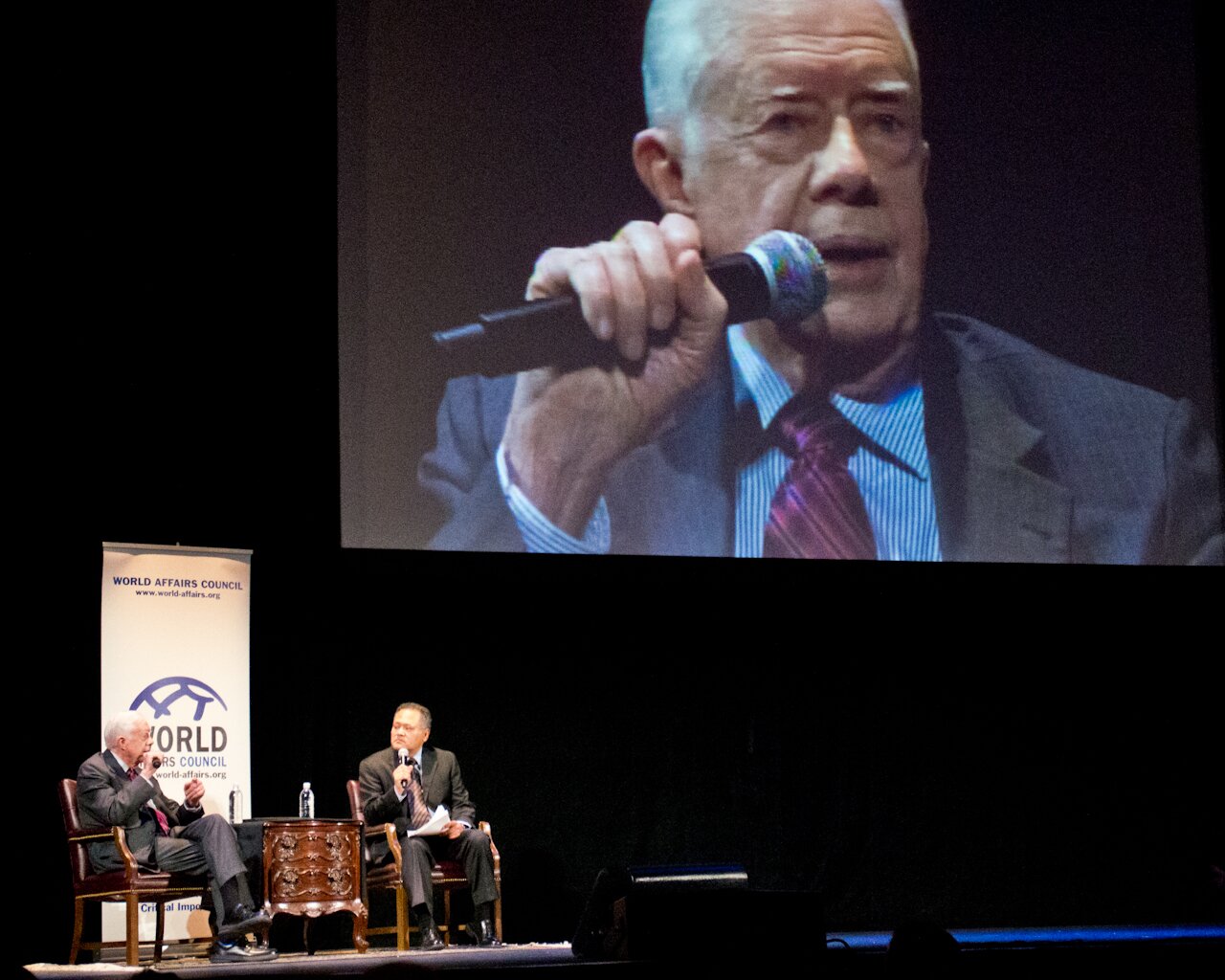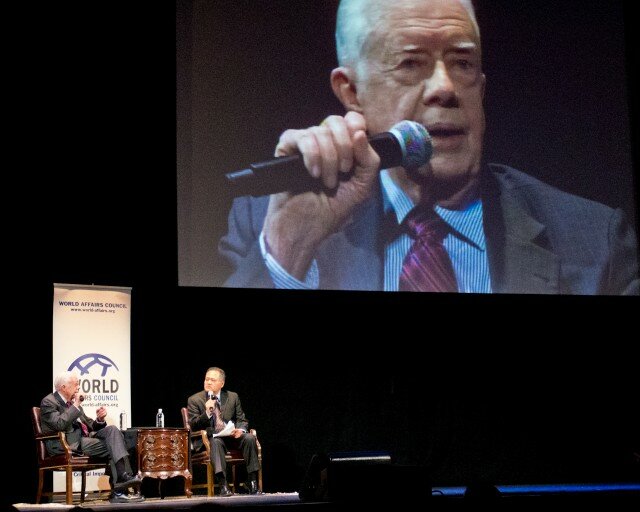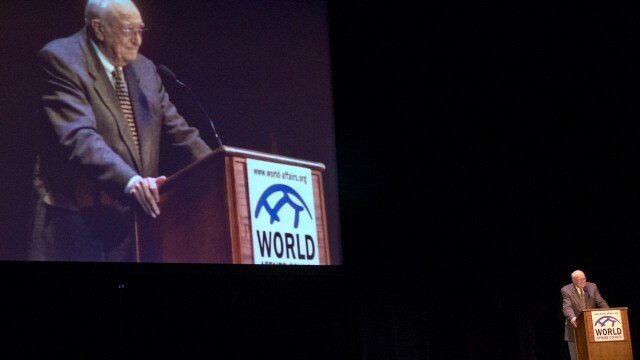Seattle’s World Affairs Council, celebrating its 60th anniversary, invited former President Jimmy Carter to speak at the Paramount Theatre on January 31, 2012, on the topic of “Waging Peace, Fighting Disease, Building Hope.” The event sold out, of course, and Carter, adopting in sequence genial, peppery, and rousing moods, did not disappoint.
It’s a commonplace to remark that the 39th President has had a more successful political life outside of office than in it, and the evening’s talk indicated why that is. To his credit, Carter’s moral vision has been unshakable. Over the course of the years, the public has gained an appreciation for the reliable support of that wisdom, so often at odds with the situational ethics of political deal-making.
But as ever, people prefer their prophetic counselors not to ask for the obedience given to kings–electoral history shows that people admire Carter’s moral suasion more than like to abide by it. It’s easy to forget how people bridled at seemingly everything he did in office, including putting on a sweater rather than turning up the heat. Yet, history rhymes and so Carter wears laurels.
Kent-Meridian High School‘s Lisa Clarke, accepting her World Educator award with a certain fieriness–demanding that education fixers stop treating students as widgets and test scores and decrying the “broken schools” meme–recalled a student’s response to hearing about Carter’s third State of the Union address. Thirty years ago, Carter read this line, which can easily be copy-and-pasted into an Obama address:
The crises in Iran and Afghanistan have dramatized a very important lesson: Our excessive dependence on foreign oil is a clear and present danger to our Nation’s security.
“Ms. Clarke,” said the student, “President Carter is a genius.” That may be, but thirty years later, Carter’s talk last night responded to current-day rumors of “military intervention in Iran.” When it comes to oil dependency, moral suasion appears to be about as useful as admonishing addicts to get right with God.
Carter began by joking about out-of-office popularity boosts, recalling a New Yorker cartoon where a boy tells his father, “When I grow up, I want to be a former President,” and retailing the story of how, on a trip to south Japan, he gave a speech that included a humorous anecdote.
Because he was mindful of time, he cut it short so his translator would have less work to do, but his translator made shorter work of the story than he did. Even so, the audience erupted in laughter. Buttonholing the translator afterward, Carter wanted to know how he’d managed to condense so much. After a few evasive response, the translator admitted, “I told them, ‘President Carter has just told a funny story, you should laugh now.'”
Then Carter launched into a pointed summary of his time in office–remember “zero-based budgeting“?–recalling the world as it was, with Cold War Russian ICBMs 26 minutes by air from Washington, DC, and New York City. Technology, he said, was behind the job creation push of his term in office, and behind the reshaping of the modern U.S. military. (Now, he warned, we are not investing enough in infrastructure. Carter dropped a “1 percent” reference while pointing out that here in the U.S. our high-speed rail is lucky to hit 65 mph, and that China has some 6,000 miles of rail that can average 125 mph. On a recent trip to China, he rode one that hit 270 mph.)
Though Carter talks more of peace, the former senior officer of the pre-commissioning crew of the Seawolf, the U.S.’s second nuclear submarine, is a stout defender of a strong military. “I follow the Prince of Peace,” Carter, a fervent Christian, may say, but his conception may be similar to Julia Ward Howe‘s, in its inclusion of “the fateful lightning of His terrible swift sword.” (Also, as a Christian, Carter has always been opposed to abortion. He was sworn to uphold Roe v. Wade, he said, but he did everything he could to make abortion the last possible option by funding adoption and infant care.)
That said, Carter believes that the most important benefit of military supremacy is not having to use it. Of his four years, he said with spirit, “We never dropped a bomb, we never launched a missile, we never fired a bullet” in warfare.
The heart of Carter’s talk, though, was human rights–broadening what we mean by them, and being accountable for them. By some counts, he noted, since 9/11 the U.S. has violated seven of the 30 points in the United Nations Declaration of Human Rights. As a wealthy country, he argued, we can let our human rights conversation get libertarian-ly rarefied–basic human rights are things like food, shelter, education, and health care. A commitment to expanding these human rights can direct U.S. policy in ways that promote peace and restore the world’s respect and admiration for the United States.
In the end, Jimmy Carter is still Carter. Asked about the U.S., China, and trade, he suggested simply forming a panel of “wise men (and women)” to sit down and iron out the differences between a nation of 1.3 billion and .3 billion. (At Camp David with Begin and Sadat, he mentioned, the first thing he did was suggest they ask the world to pray for their efforts. He wrote out a prayer, and: “Sadat approved it immediately, and Begin edited it heavily.”) He’s willing to give Egypt’s Muslim Brotherhood a chance. A two-state solution is the only viable path to peace in the Mideast. People just need to keep sitting down together and talking.
China has adopted a slogan, he said, “Harmony at home,” that he’d like to see applied more in the U.S. as well. In his day, candidates referred to “my distinguished opponent.” And he fears the polarization caused by relentless negative campaigning will be exacerbated by the Supreme Court’s “stupid decision” that’s creating an even more massive infusion of money into the political arena. To the young people–600 high schoolers were in the audience–he said that they had a unique role to play socially, being full of idealism untempered by the usual compromises of niggling necessity: “Let your voice be heard in the most aggressive, combined way possible.”
 While I lament the loss of Lamb Jam and Cochon 555 (my two favorite food events are taking breaks this year, though watch for Lamb Jam in Portland), I can recommend an upcoming event for those seeking gastronomic satisfaction: the Seattle Wine and Food Experience.
While I lament the loss of Lamb Jam and Cochon 555 (my two favorite food events are taking breaks this year, though watch for Lamb Jam in Portland), I can recommend an upcoming event for those seeking gastronomic satisfaction: the Seattle Wine and Food Experience.







